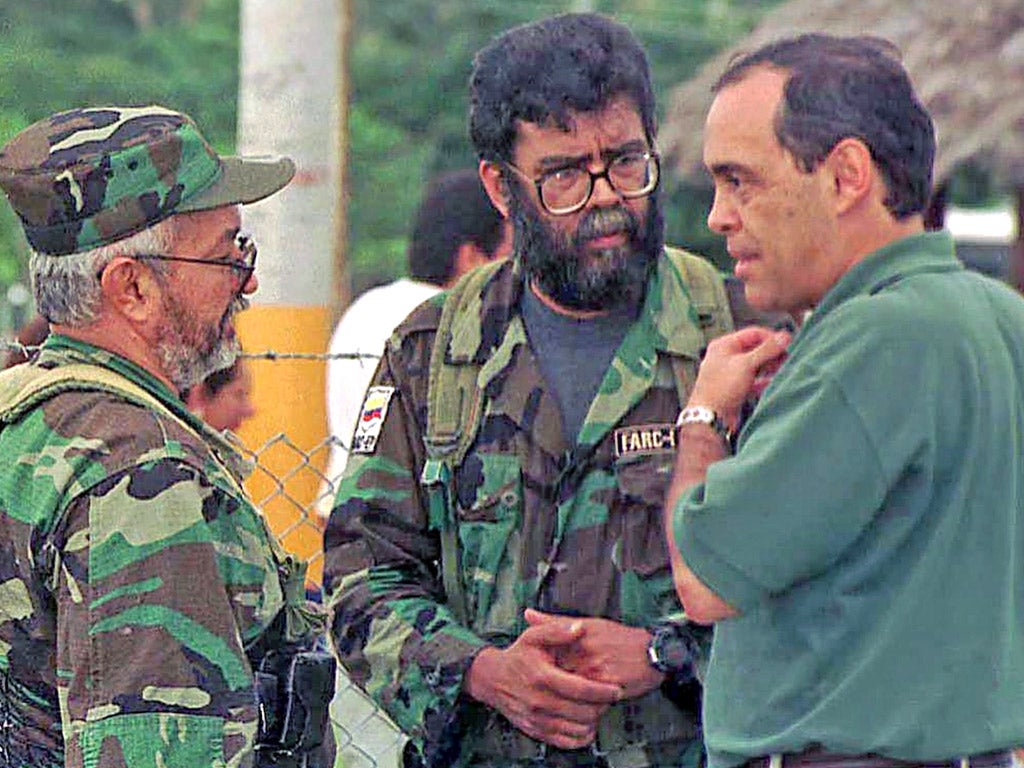Will rebel leader's grisly death bring an end to 50-year civil war?

After months of hunting the intellectual guerrilla leader Alfonso Cano through Colombia's rugged south-west, a bullet to the neck last Friday brought the government one of its biggest victories yet in the five-decade battle against Farc rebels.
Cano – real name Guillermo Leon Saenz – had gone from the bourgeois suburbs of Bogota and the prestigious environs of the National University to the then-Soviet Union and returned to preach his fiery Marxist rhetoric in the jungles of the Farc heartland. He rose quickly among the ranks of the leftist rebels and become leader of the Revolutionary Armed Forces of Colombia – better known by their Spanish acronym, Farc – in 2008 after the group's founder, Manuel Marulanda, died of a heart attack.
The 63-year-old Cano was flushed out of a rebel encampment in Cauca province by an air bombardment. Elite commandos moved in and shot him dead, with the army releasing pictures of the bleeding guerrilla crumpled in the long grass (inset).
Soon after Cano's death, President Juan Manuel Santos released a statement saying it signalled a "breaking point" for Farc. But he cautioned: "This well-aimed blow will not be alone, and is no cause for triumphalism in the government or our military. The government continues its campaign to restore state authority across our territory."
Some Colombians celebrated the news. Miguel Martinez, 37, an architect, said he believed that Farc would never regain the territory they once had. "They're slowly going to all die in the jungle and leave our country to finally develop," he said.
But the euphoria was tempered by caution, with Farc rejecting Mr Santos's calls for them to surrender. "It is just a political and media victory for Santos, who has been battling rising criticism for weak defence tactics against increased attacks by Farc," said Ariel Avila, from the think-thank Nuevo Arco Iris. "You can't destroy a five-decade peasant revolution by killing one leader; they are not just going to surrender in return for nothing."
There was also a fear that the assassination had killed any chance of a lasting, negotiated peace, because Cano was among the few people at the top of the Farc leadership with whom the government could have negotiated. "He repeatedly said in public he felt that the best way out of the conflict was through negotiations," said Miguel Ortiga, a researcher at the Foundation for Ideas Towards Peace.
The government has taken a carrot-and-stick approach to the insurgency, which began in 1964 as a Marxist peasant movement to overthrow its rule. Although Farc claimed to serve as a bulwark against Colombia's ruling class, it has since been criticised for losing its original ideology and funding much of its operations with money from the drug trade. Rebels who lay down their arms have been offered amnesty, but those who fight on have faced a fierce military onslaught.
In Mr Santos's recent address, he called on Farc to negotiate and demobilise, "because as we have said so many times and as we have proven, you will end up in jail or in a coffin". While there are those who doubt whether Cano's death will be the final blow for the leftist movement, some experts say the military gains made over the years were now irreversible. "The army won the war against Farc a few years ago, when they cut in half the amount of armed men and their presence in the territory," said Alfredo Rangel, from the Foundation for Security and Democracy.
Subscribe to Independent Premium to bookmark this article
Want to bookmark your favourite articles and stories to read or reference later? Start your Independent Premium subscription today.

Join our commenting forum
Join thought-provoking conversations, follow other Independent readers and see their replies